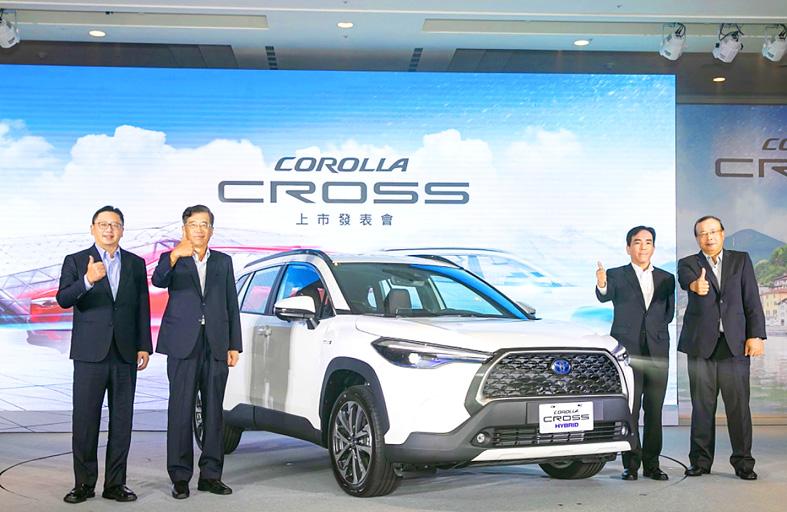New vehicle sales grew at an annual pace of 15.9 percent last month, due to stable economic growth and new model launches against a decline in global auto sales due to chip shortages, online market researcher U-Car.com said in a report on Thursday.
New vehicle sales climbed to 43,000 units last month, the best figure for March in 16 years. It also represented a 59 percent increase from 27,174 units in February, according to the report.
In the January-to-March quarter, total new vehicle sales rose 16.85 percent to 121,575 units, compared with 104,046 vehicles a year earlier, the report said.

Photo: Amy Yang, Taipei Times
“As the government has adequately contained the spread of COVID-19, the nation’s economy and consumer consumption have been less affected by global uncertainties, but show robust growth. The latest new car sales are evidence of that,” the report said.
Hotai Motor Co (和泰汽車), which distributes Toyota and Lexus vehicles, sold 14,066 vehicles last month, surging 82 percent from 7,718 units in February.
The growth was due to strong sales of Toyota Corolla Cross sports utility vehicles (SUV), with 4,142 units sold, making it the best-selling vehicle last month, the report said.
The Toyota RAV4 SUV followed with 2,193 units sold, almost doubling its 1,214 units sold in the previous month and outselling Honda CR-V’s 1,896 units, the report said.
The Honda CR-V ranked No. 2 among the top 10 best-selling vehicles in February.
Hotai’s market share climbed to 32.5 percent from 28.4 percent, to hold on to its leading market position.
Honda Taiwan Co (台灣本田) followed with a market share of 7.2 percent, with vehicle sales increasing 76.1 percent month-on-month to 3,132 units, while Yulon Nissan Motor Co’s (裕隆日產) market share was 7 percent, with sales rising 39.6 percent to 3,008 units.
Mercedes-Benz Taiwan Ltd’s (台灣賓士) sales grew about 22.5 percent to 2,856 units, but the luxury vehicle importer’s market share fell to 6.6 percent from 8.6 percent in February.
Ford Lio Ho Motor Co’s (福特六和) sales soared 64 percent as it sold 2,670 units last month to grab a market share of 6.2 percent, the report said.

DIVIDED VIEWS: Although the Fed agreed on holding rates steady, some officials see no rate cuts for this year, while 10 policymakers foresee two or more cuts There are a lot of unknowns about the outlook for the economy and interest rates, but US Federal Reserve Chair Jerome Powell signaled at least one thing seems certain: Higher prices are coming. Fed policymakers voted unanimously to hold interest rates steady at a range of 4.25 percent to 4.50 percent for a fourth straight meeting on Wednesday, as they await clarity on whether tariffs would leave a one-time or more lasting mark on inflation. Powell said it is still unclear how much of the bill would fall on the shoulders of consumers, but he expects to learn more about tariffs

NOT JUSTIFIED: The bank’s governor said there would only be a rate cut if inflation falls below 1.5% and economic conditions deteriorate, which have not been detected The central bank yesterday kept its key interest rates unchanged for a fifth consecutive quarter, aligning with market expectations, while slightly lowering its inflation outlook amid signs of cooling price pressures. The move came after the US Federal Reserve held rates steady overnight, despite pressure from US President Donald Trump to cut borrowing costs. Central bank board members unanimously voted to maintain the discount rate at 2 percent, the secured loan rate at 2.375 percent and the overnight lending rate at 4.25 percent. “We consider the policy decision appropriate, although it suggests tightening leaning after factoring in slackening inflation and stable GDP growth,”

Meta Platforms Inc offered US$100 million bonuses to OpenAI employees in an unsuccessful bid to poach the ChatGPT maker’s talent and strengthen its own generative artificial intelligence (AI) teams, OpenAI CEO Sam Altman has said. Facebook’s parent company — a competitor of OpenAI — also offered “giant” annual salaries exceeding US$100 million to OpenAI staffers, Altman said in an interview on the Uncapped with Jack Altman podcast released on Tuesday. “It is crazy,” Sam Altman told his brother Jack in the interview. “I’m really happy that at least so far none of our best people have decided to take them

As they zigzagged from one machine to another in the searing African sun, the workers were covered in black soot. However, the charcoal they were making is known as “green,” and backers hope it can save impoverished Chad from rampant deforestation. Chad, a vast, landlocked country of 19 million people perched at the crossroads of north and central Africa, is steadily turning to desert. It has lost more than 90 percent of its forest cover since the 1970s, hit by climate change and overexploitation of trees for household uses such as cooking, officials say. “Green charcoal” aims to protect what